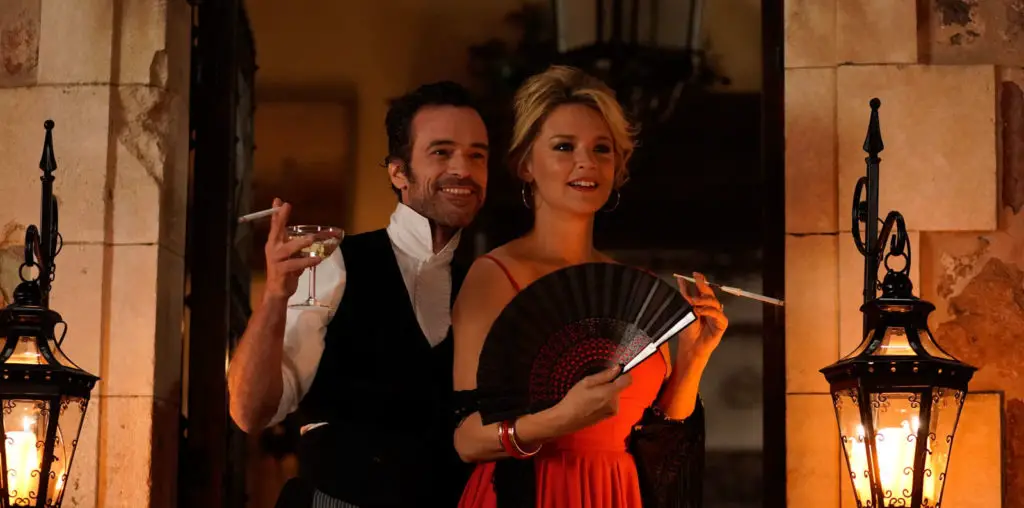
Suspenseful. Atmospheric. Intense. These are words that can be used to describe Alejandro Amenábar’s 1997 Spanish psychothriller Abre los Ojos (Open Your Eyes). “Vanilla Sky,” Cameron Crowe’s remake of Amenábar’s film, remains so slavishly faithful to the original’s story that one would think it would only follow that those same terms could also be applied to it. But “Vanilla Sky” is proof that simply copying a very good film does not ensure that your film will be good — in fact, as Crowe proves here, imitation can indeed be the sincerest form of flattery by being so bad in comparison.
Crowe was, after all, a curious choice to write the script for and direct this particular project, which had been sort of a pet one for its star-producer, Tom Cruise. After all, Crowe is best known for his seriocomic personal stories like last year’s Oscar-winning Almost Famous, not twisted, twisty thrillers such as Abre los Ojos. But instead of stretching and adjusting his personal sensibilities to the needs of the specific piece and its genre, in “Vanilla Sky” Crowe instead grafts his usual approach and style onto this most ill-fitting material, making for a frustratingly uneven work.
After an opening that apes the original right down to the non-translated line “Abre los ojos,” “Vanilla Sky” quickly gets into a light mode that is typical Crowe. Cruise plays publishing company head David Aames, a classically Cruise cocky handsome guy, who is in a no-strings sexual relationship with musician Julie Gianni (Cameron Diaz, doing the best job of the entire cast). Or so he thinks. When David takes an interest in Sofia Serrano (Penelope Cruz, pointlessly reprising her Ojos role), his best friend Brian Shelby’s (Jason Lee, scene stealing with his usual schtick) date at a party, a jealous Julie flies off the deep end — quite literally, with David along for the ill-fated ride in her car.
This should have signalled the point where “Vanilla” leaves cozy Crowe country and ventures into the darker areas explored by Amenábar’s original, but aside from the odd flash-forward where a masked David recounts his story to a psychiatrist (a nondescript Kurt Russell), the tone continues to be largely sunny–even with David’s face having been disfigured by the auto accident; in fact, Cruise’s performance in a scene where David is given a mask by his doctors recalls one of his more memorably over-the-top comic scenes in Crowe’s “Jerry Maguire.” As David continues his rather tiresome pursuit of Sofia, not a single trace of tension or dread is generated–unless you count the dread the audience feels whenever the wooden and tense Cruz opens her mouth to butcher yet another line of Crowe’s dialogue. Time and again the dialogue shows Crowe’s celebrated flair, and the David/Sofia exchanges would have made for some sparkling romantic repartée had he cast a female lead with some slight grasp of the English language. Or charisma. Or charm. Or personality. Or on-screen chemistry with Cruise. Or beauty.
Without the proper build-up or atmosphere, a key turning point in “Vanilla Sky” is hardly the pull-the-rug-out-from-under-you, gasp-worthy moment it is in the original, though “Vanilla” finally starts to resemble a thriller when the scene hits. By then, though, it’s too late, and Crowe ends up just piling on the evidence that he was the wrong person for the job. Crowe’s already-curious music choices–Nancy Wilson’s guitar-driven score is a primary mood-killer–become even more distracting and baffling. Crowe apparently was distracted himself, for he fails to notice that as the character of David becomes more unhinged, so does Cruise, who gets hammier by the second. Nothing quite better sums up just how haywire “Vanilla Sky” gets than a scene where the camera makes circles around a hysterical David, who continually screams “Tech support!” as the Beach Boys’ “Good Vibrations” blares on the soundtrack. And the audience isn’t supposed to laugh?
There’s no denying that Abre los Ojos grows more preposterous as it goes along, and its closing twists and explanations are way out there. But by that point in that film Amenábar had created such a palpable mood of uncomfortable uncertainty that the outré resolution made a strange sort of sense. Crowe is a realist, and the sense of naturalism he brings to most of “Vanilla Sky” makes its final, surreal stretch feel that much more ridiculous. As in the original film, “Vanilla Sky” ends with the words “open your eyes” — but provided how difficult it often is to watch this lifeless, completely unnecessary desecration of an interesting, exciting film, one will want to keep their eyes wide shut.
